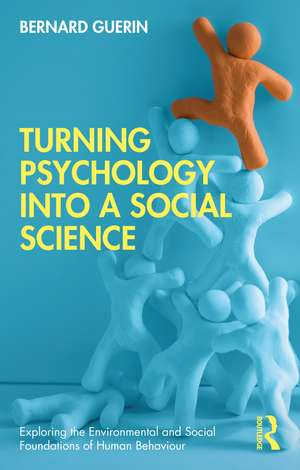Turning Psychology into a Social Science: Exploring the Environmental and Social Foundations of Human Behaviour
Autor Bernard Guerinen Limba Engleză Paperback – 20 iul 2020
By showing that we engage directly with our complex social, political, economic, patriarchal, colonized, and cultural contexts and that what we do and think arises from this direct engagement with these external contexts, Bernard Guerin expertly demonstrates that Western ideas have systematically excluded the ‘social’ but that this is really where the major determinants of our behaviour arise. This book works through many human activities that psychology still treats as individualized and internal and shows their social and societal origins. These includes beliefs, the sense of self, the arts, religious behaviours, and the new and growing area of conservation psychology. The social structures found by sociology, anthropology and sociolinguistics are shown to shape most ‘individual’ human actions, and it is shown how the main points of Marxism and Indigenous knowledges can be better merged into this new and broader social science.
Replacing the ‘internal’ attributions of causes with external contextual analyses based in the social sciences, this book is fascinating reading for academics and students in psychology and the social sciences, and provides exciting new ways to conceptualize and observe human actions in new ways and to resist the current individualistic thinking of ‘psychology’.
| Toate formatele și edițiile | Preț | Express |
|---|---|---|
| Paperback (1) | 274.82 lei 6-8 săpt. | |
| Taylor & Francis – 20 iul 2020 | 274.82 lei 6-8 săpt. | |
| Hardback (1) | 996.33 lei 6-8 săpt. | |
| Taylor & Francis – 20 iul 2020 | 996.33 lei 6-8 săpt. |
Preț: 274.82 lei
Nou
Puncte Express: 412
Preț estimativ în valută:
52.60€ • 57.16$ • 44.22£
52.60€ • 57.16$ • 44.22£
Carte tipărită la comandă
Livrare economică 21 aprilie-05 mai
Preluare comenzi: 021 569.72.76
Specificații
ISBN-13: 9780367898120
ISBN-10: 0367898128
Pagini: 182
Dimensiuni: 138 x 216 x 13 mm
Greutate: 0.22 kg
Ediția:1
Editura: Taylor & Francis
Colecția Routledge
Seria Exploring the Environmental and Social Foundations of Human Behaviour
Locul publicării:Oxford, United Kingdom
ISBN-10: 0367898128
Pagini: 182
Dimensiuni: 138 x 216 x 13 mm
Greutate: 0.22 kg
Ediția:1
Editura: Taylor & Francis
Colecția Routledge
Seria Exploring the Environmental and Social Foundations of Human Behaviour
Locul publicării:Oxford, United Kingdom
Public țintă
General, Postgraduate, Professional, and Undergraduate AdvancedCuprins
List of tables Preface Acknowledgements A note on referencing 1. The opposite of rational is social, not irrational or crazy: How the ‘social’ got squeezed out of Western history 2. How are our behaviours shaped by societal ‘systems’ and ‘structures’? 3. The societal ecologies of modern life are our ‘psychology’ 4. Contextualizing beliefs as everyday language strategies 5. Self, identity, consciousness, and meaning as social actions in context 6. A new look at Marxism, psychology, and social contextual analysis 7. Contextualizing the arts 8. Contextualizing religion and religious behaviours 9. Weaning yourself off social psychology Index
Notă biografică
Bernard Guerin has worked in both Australia and New Zealand researching and teaching to merge psychology with the social sciences. His main research now focuses on contextualizing ‘mental health’ behaviours, working with Indigenous communities, and exploring social contextual analyses especially for language use and thinking.
Descriere
This book shows how everything we do is social and how research from social anthropology, sociolinguistics, and sociology can be integrated into a new form of psychology. It is part of a trilogy that offers a new way of doing psychology focusing on people’s social environments as determining their behaviour, rather than internal attributions.









